Slate, Pete Buttigieg, And The Limited Market For Left-Wing Identitarianism
Most of America, Democrats included, probably isn't interested in what Slate's selling
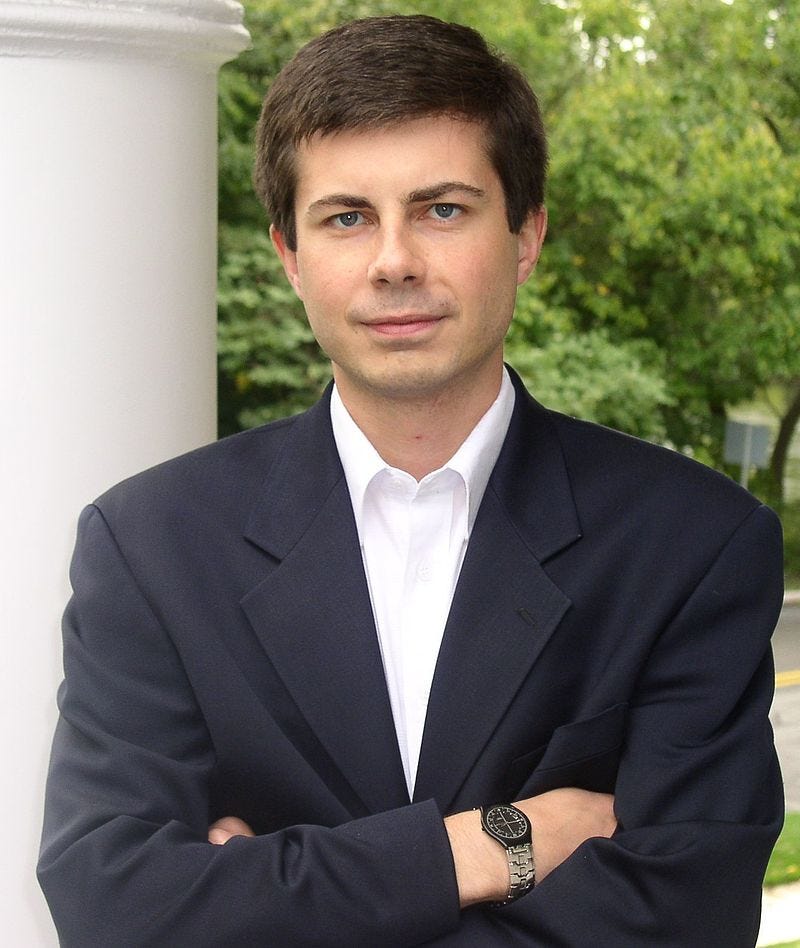
Thursday, Slate ran an article by a staff writer there, Christina Cauterucci, headlined “Is Pete Buttigieg Just Another White Male Candidate, or Does His Gayness Count as Diversity?” The headline alone caused a minor firestorm on social media, triggering, above all, that familiar refrain: Identity politics has gone too far!
I don’t really like how “identity politics” has become a piñata whenever this sort of thing comes up. It doesn’t quite capture the problems with an article like Cauterucci’s and with the approach to politics it reflects. Identity politics is really just any instance of a group advocating for its own interests, often by arguing it hasn’t been treated fairly or is being screwed over by some other group or some bigger force. The civil rights and women’s suffrage movements were instances of effective identity politics.
‘Identitarianism’ is a bit better. In poking around online, I came across the blog of Matt Drabek, a philosopher and the author of the very interesting-looking Classify and Label: The Unintended Marginalization of Social Groups. Drabek argues against identitarianism on the left, from the left, laying out the identity politics/identitarianism distinction as follows in a post from last June:
-‘Identity politics’ picks out any politics aimed at advancing the interests of a discernible identity group or groups.
-‘Identitarianism’ picks out any politics or movement that reduces political issues entirely or almost entirely to issues of identity.
That seems about right to me. And it captures what feels like a burgeoning tendency in certain left-of-center spaces, particularly elite ones. Since it has certain characteristics unique to it and not held by right-wing forms of identitarianism, let’s call it left-wing identitarianism, or LWI, for short. This is somewhat blunt phrasing, since there are far-left socialist identitarians and center-left Hillary-Clinton-supporting identitarians, but it gets the point across well enough.
LWI has certain defining features that pop up endlessly. One is that it makes strong causal claims about the connection between race and behavior or belief. In 2017, for example, I wrote an article for New York’s website called “Whiteness Doesn’t Cause Mass Shooting,” a response to the radical leftist professor George Ciccariello-Maher’s lament on Democracy Now! that “[W]hiteness is never seen as a cause, in and of itself, of these kinds of massacres, of other forms of violence, despite the fact that whiteness is a structure of privilege and it’s a structure of power, and a structure that, when it feels threatened, you know, lashes out.”
This is a really good example of the miles-wide gap between how traditional progressivism and LWI handle the question of race and crime.
Traditional progressivism: If there’s a link between race and crime, it isn’t about race itself — being one race or another, doesn’t, on its own, cause someone to be more criminal via properties essential to that racial group. Rather, the race-crime link is mediated by all sorts of other variables, like poverty and lack of access to opportunity.
Left-wing identitarianism: There is a causal link between race and crime when it comes to white crime, because of the essential qualities of whiteness.
In fact, LWI has a tendency to reduce all sorts of complicated stuff to whether or not the person doing that stuff is a member of majority or minority groups. Among the most ardent left-wing identitarians, the first step toward explaining anything is identity groups. For example, today there’s a push on the left against what is derided as “the sex binary,” or the idea that the vast majority of humans can be divided into biological males and biological females. Why is this idea so popular in the first place? From a LWI perspective, identity is always the culprit. So in this case, the blame lies with cisgender people, heterosexual people, men (via their patriarchy), and white people. That’s why if you poke around, it won’t be hard to find many people who claim that white cisheteropatriarchy (or some similar identity-focused term), usually imposed via colonialism, is the reason so many people believe there are two sexes.
A lot of LWI theorizing raises more questions than it answers. How would one prove that “whiteness” causes mass shootings, especially given the evidence that whites don’t commit a disproportionate percentage of them? Even if they did, if whiteness is an acceptable explanation for some murders, doesn’t that open the door to blackness being an acceptable explanation for others? If the sex binary was imposed by cisheteropatriarchal colonists, why do so many indigenous cultures show, in artifacts and artwork dating back millenia before their contact with, say, pillaging Spaniards, that they understood humans as being generally divided into males and females with very distinct characteristics, and moreover that they imposed very different expectations on those two sex classes? (The latter would suggest that the “gender binary,” too, wasn’t invented by white cisheteropatriarchal colonists.)
LWI also has a distinct approach to epistemology and argument focused less on traditional conceptions of logic and reason historically important to progressivism and its political victories, and more on the identity characteristics of the person making the claim.
Traditional progressivism: If X and Y disagree, they should each present and consider one another’s evidence and its relative strengths and weaknesses. The argument that ‘wins’ should be the one that is seen as more logically sound and/or evidence-based in light of premises X and Y agree that they share. [This is all easier said than done and I’m obviously painting with a broad brush here.]
Left-wing identitarianism: If X and Y disagree on a social-justice subject, then whichever person has more marginalized identity characteristics relevant to the debate should be seen as the authority, regardless of the specifics of the argument in question. Whoever has fewer relevant marginalized identity characteristics should be deferential: s/he should sit back, listen, and learn rather than participate directly in the debate in question.
I know this sounds like something Bill O’Reilly would make up, but if you look around in certain left-of-center spaces, you’ll see it everywhere. And it stems, again, from the belief that identity explains almost everything. The reason Y can’t chime in on an issue if she isn’t a member of a marginalized group is that only members of that group have access to certain insights and forms of knowledge.
There’s obviously a kernel of truth to claims like “The average black person can understand and explain the feeling of being followed around a department stores in a way the average white person cannot.” That’s an important insight, and one of many good arguments for diversifying newsrooms, academia, and other institutions. Homogeneity can bring with it myopia, especially with regard to the concerns of groups with less societal power.
But left-wing identitarianism extends these eminently reasonable observations, which are more or less consensus progressive beliefs, and over-essentializes everything to the point where certain groups are seen as being more or less completely incapable of chiming in on certain issues, because they lack some essential identity characteristic. Here’s one of a trillion possible examples plucked from Twitter, featuring Susan Fowler, a New York Times opinion writer:
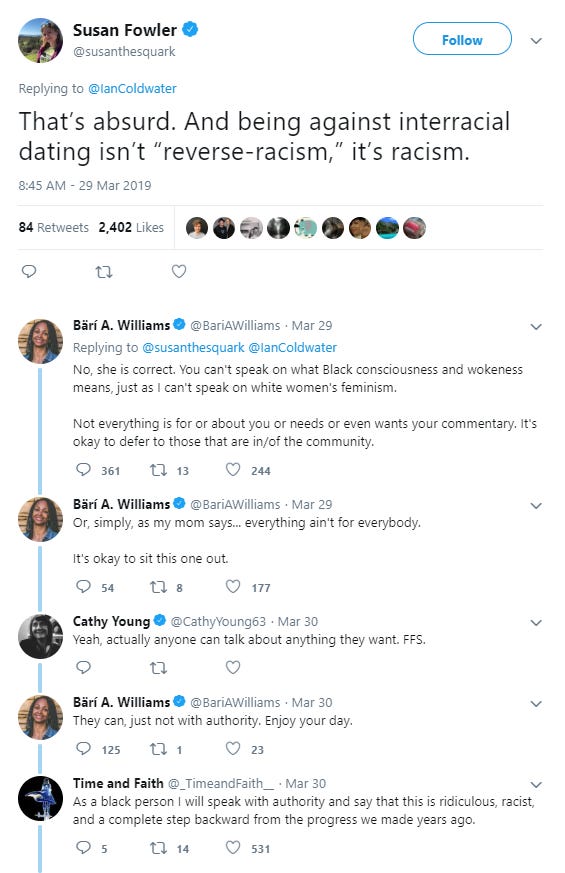
I’m not meaning to single out Bari A. Williams, who Twitter says works in the tech industry, in particular — her claim that she herself “can’t speak on white women’s feminism,” and that people who lack certain identity labels cannot speak on certain other things “with authority,” is quite common among left-wing identitarians.
It’s also a total repudiation of the progressive intellectual tradition. Were this to become a general rule, a lot of important work would be discarded. Matthew Desmond, for example, is a MacArthur-winning sociologist whose Pulitzer-winning book Evicted: Poverty and Profit in the American City is one of the most important published in the last decade, in part because of its detailed, heartbreaking account of the ways racism intersects with poverty at the rock bottom of the housing market. Kwame Anthony Appiah is a biracial philosopher whose own recent, excellent book, The Lies That Bind: Rethinking Identity, touches, upon other subjects, on how various white peoples in Europe have understood identity over the years. Desmond writes about black people despite being white; Appiah writes about white people despite not being white. And I’d argue that because both men are brilliant and so obviously do their homework, both should be allowed to continue studying whatever they want to study, even when it involves crossing racial boundaries. (I could be biased because I was lucky enough to interview Desmond here and Appiah here.)
Desmond and Appiah probably have little to fear from left-wing identitarians, luckily, because this rule about who is allowed to write or say what is very rarely applied consistently, in my experience. It’s more of a cudgel used to whack away at dissenting views without engaging with them intellectually. White people who make claims that line up with progressive or leftist orthodoxy on race, for example, are rarely told that they shouldn’t chime in on these issues because they are white. By that same token (no pun intended), black people who make conservative arguments about race or other issues aren’t given any slack for being black — if anything, they’re criticized even more vociferously for taking a stance that goes ‘against’ their skin color. Sometimes, they’re accused of being Uncle Toms, more or less. (Again, left-wing identitarians have trouble understanding anything except through the prism of identity.)
Setting aside inconsistency, the problem here is obvious: Within big groups that share superficial similarities like skin color, there is massive disagreement. And that argument I made in February, that progressives have a tendency to talk over marginalized people and assume they hold more left-leaning positions than many of them actually do? Left-wing identitarians are the prime culprit. They really, really don’t like the idea that while black people are overwhelmingly left-of-center, many have politics somewhat to the right of Ta-Nehisi Coates, or that Muslim Americans are significantly less in favor of gay marriage than the broader population. This not only disrupts but is an active threat to their core worldview, that identity causes belief and behavior in a straightforward way, and that power-up groups hold the ‘wrong’ beliefs while power-down groups hold the ‘right’ ones. If you have a theory that you think explains the world, and someone presents evidence which calls that theory into question, of course that evidence is going to make you uncomfortable and you’re going to ignore it or shout it down. Left-wing identitarians aren’t good at handling the fact that white and black and Muslim and gay and trans and South Asian people all have a wide range of beliefs, and that members of these groups are individuals who often don’t conceive of themselves, first and foremost, as members of these sorts of zoomed-out identity groups.
Let’s Get Back To That Darn Article
Cauterucci’s Slate article is, at root, a left-wing identitarian critique of Pete Buttigieg. For those unfamiliar with the guy, Buttigieg isn’t a nationally known figure, but he’s fast becoming one. The South Bend, Indiana mayor — also known as “Mayor Pete” — seems to be surging a bit in the early days of the Democratic primary race: In one poll of Iowa Democratic Caucus voters, he’s now in third place behind Joe Biden and Bernie Sanders. On the surface level, he has an intriguing bundle of qualities for a Democratic candidate, particularly given that the Democrats will need to claw back some of the Midwestern ground they lost in the 2016 race if they are going to oust Donald Trump: He’s a young, energetic, fairly moderate white dude born and raised in South Bend, he served in Afghanistan, and he went to Harvard and to Oxford on a Rhodes Scholarship (like a fairly recent Democratic president also known for being moderate and heartland-friendly).
And, yes, he’s gay. But he isn’t, you know, gay. Or at least that seems to be the point of Cauterucci’s argument. After quoting various media figures arguing on Twitter (where else) over whether it’s fair to view Buttigieg as “just another white guy,” Cauterucci sets up her argument as follows:
These aren’t just random tweets; the conversation is at the heart of a broader debate on the left about identity and representation. After Democrats failed to win what looked like an easy general election for the country’s first major-party female presidential nominee in 2016, some progressives worried that Democratic voters would be too spooked—or too sexist—to nominate a woman again. Maybe Dems would be safer, some wondered, with a nice progressive white guy. But for many liberals, a return to the old pattern of putting forward white men in the mold of the disproportionate majority of American politicians would be a capitulation to American voters’ worst biases. In an era of rising white nationalism, escalating attacks on immigrants and reproductive justice, and a surge of women running for political office, a run-of-the-mill white male candidate doesn’t seem like the right face for the future of the Democratic Party.
As with many LWI arguments, there’s a kernel of truth here. Of course it’s shameful that, in 2019, we’ve only had one nonwhite president and zero female ones. But Cauterucci’s argument goes further. To a left-wing identitarian, a candidate’s identity characteristics really matter the most. If a white guy wins, regardless of what sort of white guy and what his stances are on, say, racial politics and redistribution, it will be a “capitulation to American voters’ worst biases.” A white guy — again, politics and policies unknown — “doesn’t seem like the right face for the future of the Democratic Party.” (It’s just four years, and he’ll get to make about a million appointments to powerful posts!)
Cauterucci goes on to argue that what what she’s saying about Buttigieg “doesn’t mean he’s not gay enough—there’s really no such measure. It just means that he might not be up against quite the same hurdles that a gay candidate without such sturdy ties to straight culture would be.” Again, to a left-wing identitarian what is front and center, always, is identity and how it leads to privilege or marginalization.
But despite claiming that she doesn’t think Buttigieg lacks the requisite gayness to be a true gay candidate, she does go on to critique his supposed distance from the other members of his ostensible LGBT tribe:
From what I’ve seen, Buttigieg doesn’t seem terribly sold on the idea of gayness as a cultural framework, formative identity, or anything more than a category of sexual and romantic behavior. When he came out in a 2015 essay four years into his tenure as mayor, it was with some reluctance. “I’m not used to viewing this as anyone else’s business,” he wrote. “Being gay has had no bearing on my job performance in business, in the military, or in my current role as mayor.” According to the essay, Buttigieg only decided to reveal his sexual orientation to the world because he wanted to start dating. “Like most people, I would like to get married one day and eventually raise a family. … I came out because I had to,” he wrote. He hoped his coming out would help destigmatize homosexuality in Indiana but expressed excitement for an inevitable future in which children will be “puzzled that someone like me revealing he is gay was ever considered to be newsworthy.”
These are the remarks of someone whose affiliation with the gay community only goes so far as his own gay relationships, who can seemingly only conceive of homosexuality as a value-neutral or negative—certainly not positive—aside in a person’s biography. (It’s also possible that Buttigieg, as a politician, believes this is the safest way to characterize his homosexuality.) Another queer politician might have explained how being a member of a marginalized group has informed his understanding of political and structural discrimination, or how conservative politicians contributed to the long “struggle” that preceded his acceptance of his own sexuality, or how witnessing homophobia in the military (something Buttigieg has obliquely mentioned) affected his self-image and performance in the Navy. But Buttigieg suggests that being gay has had “no bearing” at all on anything else he’s done in his life. There’s nothing objectively wrong with such an assimilationist perspective, especially for a newly out man who seems ready to lead on trans rights and other LGBTQ political issues. But it does makes him less exciting as the supposed gay trailblazer some on the left desperately want him to be. [emphasis mine]
Let’s go through the bolded items one by one to better understand how they reflect the LWI worldview, and how they offer evidence — I would argue — that outside of certain bubble-echo-chambers, there isn’t much support for this worldview.
“Buttigieg doesn’t seem terribly sold on the idea of gayness as a cultural framework, formative identity, or anything more than a category of sexual and romantic behavior.”
Again, left-wing identitarians are really into the idea of causal connections between identity and behavior or belief. That’s why it’s noteworthy to Cauterucci that Buttigieg simply views gayness as the question of who he is attracted to — which is, after all, the dictionary definition — rather than a broader ideological lens through which to view the world.
“Being gay has had no bearing on my job performance in business, in the military, or in my current role as mayor.”
This is another source of tension between traditional progressive values and left-wing identitarian values. The traditional progressive arguments for gay rights — which proved wildly successful in the long run — were basically exactly what Buttigieg is expressing here: Gay people should be treated the same as everyone else, from the workplace to the marriage altar. Full-stop. Cauterucci is highlighting this claim because it runs so strongly contrary to LWI’s belief that a marginalized identity should be front and center to anyone who has it.
“These are the remarks of someone whose affiliation with the gay community only goes so far as his own gay relationships, who can seemingly only conceive of homosexuality as a value-neutral or negative—certainly not positive—aside in a person’s biography.”
What’s striking here is how much it ignores the content of the very coming-out column Cauterucci is quoting from. In it, he writes:
But it’s clear to me that at a moment like this, being more open about it could do some good. For a local student struggling with her sexuality, it might be helpful for an openly gay mayor to send the message that her community will always have a place for her. And for a conservative resident from a different generation, whose unease with social change is partly rooted in the impression that he doesn’t know anyone gay, perhaps a familiar face can be a reminder that we’re all in this together as a community.
I’m not sure how to interpret this as anything but Buttigieg treating his gayness as a positive aside in his biography — he’s explicitly stating he thinks talking about it can help others. But because he isn’t doing it in the LWI-prescribed way — treating his gayness as a deep, perhaps unrelenting burden that forged who he is today — it’s easily ignored.
“Another queer politician might have explained how being a member of a marginalized group has informed his understanding of political and structural discrimination, or how conservative politicians contributed to the long ‘struggle’ that preceded his acceptance of his own sexuality, or how witnessing homophobia in the military (something Buttigieg has obliquely mentioned) affected his self-image and performance in the Navy. But Buttigieg suggests that being gay has had ‘no bearing’ at all on anything else he’s done in his life.”
Sure, another queer politician might do all that. But Pete Buttigieg appears to not believe that being gay has “informed his understanding of political and structural discrimination.” He likely has little love for conservative politics on sexuality, but he is going to have to spend many long months on the road in the Midwest, convincing centrist and conservative voters he has their best interests and heart and understand their struggles. Also, Buttigieg obviously isn’t saying being gay had no bearing “at all on anything else he’s done in his life” — he’s saying it doesn’t make him any better at his job. And when you jump back to the column and see that quote in its full context, it becomes even more revealing:
Whenever I’ve come out to friends and family, they’ve made clear that they view this as just a part of who I am. Their response makes it possible to feel judged not by sexual orientation but by the things that we ought to care about most, like the content of our character and the value of our contributions.
Being gay has had no bearing on my job performance in business, in the military, or in my current role as mayor. It makes me no better or worse at handling a spreadsheet, a rifle, a committee meeting, or a hiring decision. It doesn’t change how residents can best judge my effectiveness in serving our city: by the progress of our neighborhoods, our economy, and our city services.
We’re moving closer to a world in which acceptance is the norm. This kind of social change, considered old news in some parts of the country, is still often divisive around here. But it doesn’t have to be. We’re all finding our way forward, and things will go better if we can manage to do it together. In the wake of the disastrous “Religious Freedom Restoration Act” episode here in Indiana earlier this year, we have an opportunity to demonstrate how a traditional, religious state like ours can move forward. If different sides steer clear of name-calling and fear-mongering, we can navigate these issues based on what is best about Indiana: values like respect, decency, and support for families — all families.
Buttigieg’s argument, here and in his nascent presidential run, boils down to this: “I’m not hoping you view me as That Gay Man. I’m hoping you view me as That Man Who Is Good At His Job, Who Happens To Be Gay.” Right there in the text, he notes that Indiana has a long way to go with regard to the “social change” “considered old news in some parts of the country[.]” He recognizes that arguments about merit are more likely to resonate in moderate and conservative places than arguments about identity.
It makes sense that Cauterucci is suspicious of this, because the idea of being appreciated for one’s merit rather than one’s identity is anathema to LWI. She doesn’t want gay candidates to make arguments that portray their gayness as incidental to their overall identity and worth as a candidate, to downplay their oppression.
Left-Wing Identitarianism Forces People Into Boxes
LWI views the link between certain identities and marginalization as absolutely crucial to understanding America, and seeks to highlight it whatever possible. So its adherents are uncomfortable when people from marginalized groups don’t act marginalized. Regular readers will recall the emails I published from nonwhite young-adult authors who were told by white editors to write about the oppression they faced.
As one aspiring author told me:
I think the biggest thing I resent is that being told to stay in my lane for me apparently means writing about a country I wasn’t born in, have only the vaguest connection to or knowledge about, and doesn't particularly interest me. I’d much rather write about the Roman Empire or the Diadochi states after the collapse of Alexander’s empire, but it’s clear they want a very specific kind of ownvoices [that is, a story with a protagonist from his identity group(s)] from me rather than letting me write about whatever I feel like. The irony of (mostly) white women telling me the kind of diversity they want aside, if they really wanted to amplify diverse voices they’d probably be better served going and translating books from other countries that are written in their native language and selling them in the US market.
This is LWI in action: You’re a member of this marginalized group, so that group membership, and particularly how it has caused you hardship, should be front and center. Left-wing identitarians, again, have a strong bias toward essentialization. It seems to make them uncomfortable when members of marginalized groups aren’t particularly interested in talking about their marginalization, or — I hope you’re sitting down — don’t feel entirely marginalized.
If your political ideology is very focused on identity, and subscribes to the belief that any individual’s surface-level identity characteristics can tell you a lot about that person, then framing like Buttigieg’s is incomplete, if not offensive. Gay people are oppressed. This idea that Buttigieg just happens to be gay, that it isn’t central to his identity and hasn’t caused him all that much hardship (though it does sound like Buttigieg sometimes talks about the hardship it has caused him) — the LWI mind recoils.
LWI is a clearly a pretty crimped view of the world. It’s also pretty easy to rebut its arguments — “What do you mean by ‘whiteness causes mass shootings’? Can you explain exactly what you mean, causally speaking?” Almost always, left-wing identitarians can’t, because they haven’t really thought it through. So they’ll either ignore the followup question or accuse you of “defending white people” or whatever, and then you can move on with your day.
But in one respect, I’d argue that left-wing identitarianism is a bit of a threat worth monitoring for anyone who is on the left: It causes progressives and leftists to misunderstand the minds and motives of others, which can lead to tone-deaf political arguments and decisions. In Cauterucci’s piece, for example, she argues that Buttigieg is distancing himself from “queer communities” by taking his moderate, I’m-not-all-that-oppressed stance:
To me, a queer woman, it seems hard to argue that the presidential run of this apotheosis of respectability politics is a major win for diversity. Buttigieg’s perception of queer sexuality as a not-sinful but ultimately unimportant distinction—“like having brown hair,” his coming-out essay said—doesn’t make him less gay. It does, however, put some distance between him and the queer communities he’s getting credit for being the first to represent. And if I’m being cynical (or just honest), it probably makes him more electable.
“Queer communities” is lifting a heavy load here. Which queer community is Buttigieg distancing himself from? Surely there are queer communities, particularly radical ones, in which left-wing identitarianism reigns, and others, like subsets of the trans community, who continue to face threat and oppression on a near-daily basis. But do LGBT people, writ large, want to hear a lot about identity and oppression? In light of survey data, there’s at least some support for the idea that the answer is no, not particularly.
It looks like the best nationally representative polling data we have on LGBT Americans (there are way more gay Americans than trans ones, so I think it’s okay to use “LGBT Americans’’ as a proxy for “gay Americans,” public-opinion-wise) comes from a 2013 Pew survey of 1,197 of them. And it’s fascinating to read Cauterucci’s column and then flip over to its findings. Now, in reading these findings, it’s important to recognize that this survey was conducted about midway through the Obama presidency, at a time when liberals in America — the LGBT community is more liberal than Americans at large — probably felt relatively pleased with how things were going, overall.
Still: The findings offer strong support for the proposition that, depending on how one asks the question, somewhere between a solid to a strong majority of LGBT Americans aren’t particularly enthusiastic about LWI. For one thing, a shockingly low percentage of LGBT Americans, even six years ago, hadn’t been directly affected by an act of discrimination in the entire previous year:
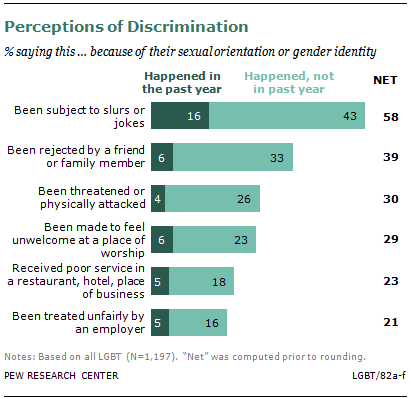
Of course it’s terrible that such high percentages of LGBT Americans had suffered from these forms of discrimination over their lifespans — the almost one-in-three stat for physical threats and assaults is particularly horrific (edit: originally had this as “the one-in-three stat” since I slightly misread the chart) — and, as Cauterucci notes in her article, the fact that gay people often aren’t visibly LGBT means it is easier for them to pass through life without attracting the attention of bigots than, say, darker-skinned people, or religious Muslims, or some trans people, or members of other groups. But still: The fact that the vast majority of gay people, as of 2013, hadn’t had any recent experience with discrimination suggests that they may not have been thinking about their identities as a source of oppression on a daily basis. (I should point out here that there is another survey, from 2017, put out by the Center for American Progress, with slightly less sunny results. But those results are presented only selectively, in the form of an article summary, and I’m skeptical of them for a few reasons. For one thing, the article claims that about a quarter of respondents experienced some form of discrimination, but doesn’t break this out by type of discrimination at all, in the way the Pew study does.)
Along those same lines, the LGBT American surveyed were also overwhelmingly optimistic about the direction of the country with regard to LGBT acceptance…
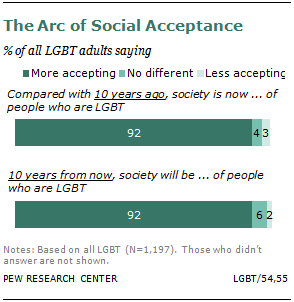
...and about the role being LGBT played in their own life (though this is another area where I would imagine trans people, who don’t show up in the chart, fared a lot worse):
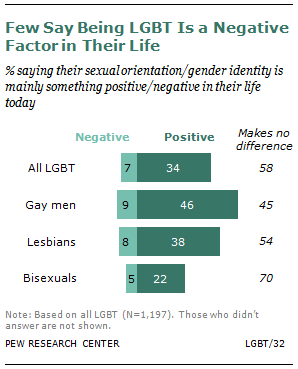
Who did they think was doing the most for gay rights? Mainstream, moderate, extremely popular figures like Barack Obama and Ellen Degeneres:
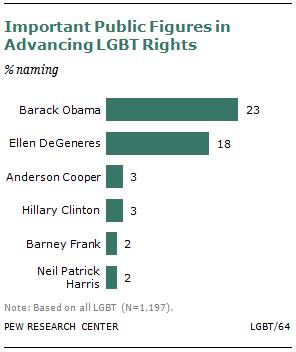
Obama, of course, has few fans among left-wing identitarians. He doesn’t talk about race in a full-throated enough way. And DeGeneres? She is beloved by straight middle-aged Boomers everywhere. Not exactly a fire-breather.
On what is maybe the closest direct proxy for the issues we’re discussing — how much identity should be central focal point of LGBT life — the community was deeply split:
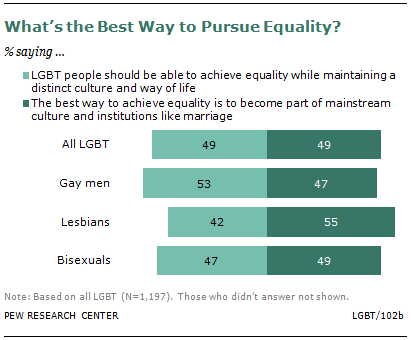
Now, the position that LGBT people “should be able to achieve equality while maintaining a distinct culture and way of life” is much more moderate than the core tenets of LWI, that privilege and oppression and identity should be central focal points of how we talk about politics. Given that even this weaker claim more or less cleaved the LGBT community in two, it stands to reason that a much smaller percentage would, if surveyed, agree with the basics of left-wing identitarianism.
It’s All Sorta Silly
This is a bubble problem. The average American, white or black or gay or straight or Jewish or Muslim, doesn’t care about whether Pete Buttigieg does or doesn’t “count as diversity,” doesn’t care whether he views himself through a sufficiently oppression-focused lens — doesn’t, in fact, care about any of this. The average American would either find this column annoying or baffling. It is written for a very specific audience, a tiny slice of Americans.
That’s not to say only a “tiny slice of Americans” cares about gay rights; the good news is you can talk about gay rights and, well, identity politics (when appropriate and useful), and oppression and injustice more broadly, in soaring, inspiring tones without employing left-wing identitarianism. LWI is one way of talking about oppression: It is not the way to talk about oppression, and disagreement with LWI does not imply conservative politics. In fact, many of the smartest critiques of LWI have come from the left on the grounds that it erases class (which it almost always does).
But even if they aren’t held by much of the general public, Cauterucci’s views on this stuff do have purchase in a lot of progressive newsrooms and organizations. You can see this in the bizarre thinkpieces trying to pin white Republican women’s preferences for Republican candidates on their whiteness, despite the fact that “being Republican” predicts support for Republican candidates far better than being white does. You can see this in the coverage of the Covington kids, much of which argued, implicitly or explicitly, that any legitimate interpretation of the key confrontation during that controversy had to center, above all else, on the races of the participants.
And on and on and on. I don’t think most Americans are left-wing identitarians. I don’t think most Democrats are left-wing identitarians. I think it will be a mistake if the left convinces itself otherwise, simply because left-wing identitarianism is so exhaustingly prevalent in certain influential elite spaces.
Questions? Comments? The inevitable notification that at some point in today’s post I misspelled either ‘Buttigieg’ or ‘Cauterucci’? I’m at singalminded@gmail.com, or on Twitter at @jessesingal. Somewhat hunky photo of Mayor Pete courtesy of Wikimedia Commons.


The Civil Rights Movement or Women's Suffrage or first wave feminism were not just "effective identity politics" They were movements to extend universal values, and their appeal was based on the claim that no special favour was being asked, and that the goal, far from being revolutionary, was actually simply correcting societies dissonance with it's own stated goals and ideals. Most importantly the success of these movements depended on the appeal to a higher identity that these movements expected particularism to be subsumed to - generally speaking the Nation, that would then stand guarantor of the rights won.
Drabeks definition of identity politics renders it pretty much indistinguishable from any politics that is sectional, parochial or group oriented. I don't think the term is being used that way at all and can't really see what utility is served by redefining it that way. Is 2 millenia of class politics to be redifined as identity politics? Parochial and sectional politics are really not the same thing even though identity is definitely involved.
Current Identity Politics is something that I think most people understand as having to do with Identities that are viewed as somehow inherent and also sliced rather than layered. Identitarian seems needlessly cumbersome. People have been using the phrase Identity Politics for some time and I don't think anyone has been confusing it with Class, Interest or old style Ethnic parochilaism.
“Of course it’s shameful that, in 2019, we’ve only had one nonwhite president and zero female ones.”
No, it's not. It's just democracy in action. When and if Americans want more nonwhite presidents or a female president they'll elect them. If elections were identitarian headcounts ALL presidents would be women, given they are always the majority.
Otherwise, thanks for an interesting article.